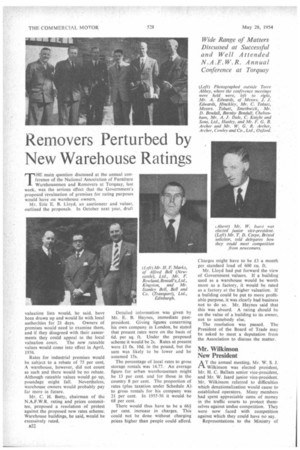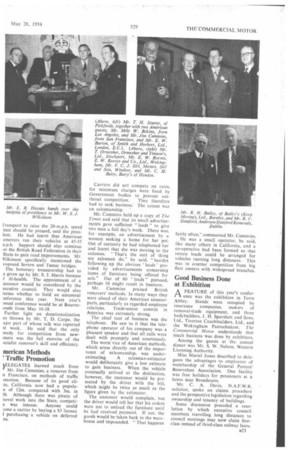Removers Perturbed by New Warehouse Ratings
Page 56

Page 57

If you've noticed an error in this article please click here to report it so we can fix it.
THE main question discussed at the annual conference of the National Association of Furniture Warehousemen and Removers at Torquay, last week, was the serious effect that the Government's proposed revaluation of premises for rating purposes would have on warehouse owners.
Mr. Eric E. B. Lloyd, an auctioneer and valuer, outlined the proposals. to October next year, draft valuation lists would, he said, have been drawn up and would lie with local authorities for 21 days, Owners of premises would need to examine them, and if they disagreed with their assessments they could appeal to the local valuation court. The new rateable values would come into effect in April, 1956.
Rates for industrial premises would be subject to a rebate of 75 per cent. A warehouse, however, did not count as such and there would be no rebate. Although rateable values would go up, poundage might fall. Nevertheless, warehouse owners would probably pay far more in future.
Mr. C. H. Batty, chairman of the N.A.F.W.R. rating and prices committee, proposed a resolution of protest against the proposed new rates scheme. Warehouse buildings, he said, would be excessively rated.
B22 Detailed information was given by Mr. E. B. Haynes, immediate pastpresident. Giving figuzes concerning his own company in London, he stated that present rates were on the basis of 6d, per sq. ft. Under the proposed scheme it would be 2s. Rates at present were £1 Os. 10d, in the pound, but the sum was likely to be lower and he assumed 15s.
The percentage of local rates to gross storage rentals was 14.77. An average figure for urban warehousemen might be 13 per cent. and for those in the country 8 per cent. The proportion of rates (plus taxation under Schedule A)to gross rentals for his company was 21 per cent. In 1955-56 it would be 68 per cent.
There would thus have to be a 66i per cent, increase in charges. This could not be done without charging prices higher than people could afford. Charges might have to be £3 a month per standard load of 600 cu. ft.
Mr. Lloyd had put forward the view of Government valuers. If a building used as a warehouse would be worth more as a factory, it would be rated as a factory at the higher valuation. If a building could be put to more profitable purpose, it was clearly bad business not to do so. Mr. Haynes said that this was absurd. A rating should be on the value of a building to its owner, not to somebody else.
The resolution was passed. The President of the Board of Trade may be asked to meet a deputation from the Association to discuss the matter.
Mr. Wilkinson New President
AT the annual meeting, Mr. W. S. 3. Wilkinson was elected president, Mr. H. C. Ballam senior vice-president, and Mr. W. Isard junior vice-president. Mr. Wilkinson referred to difficulties which denationalization would cause to established operators. Many members had spent appreciable sums of money in the traffic courts to protect themselves against undue competition. They were now faced with competition against which they could have no say.
Representations to the Ministry of fransport to raise the 20-mph. speed imit should be pressed, said the presilent. He had learnt that American emovers ran their vehicles at 45-55 n.p.h. Support should also continue or the British Road Federation in their fforts to gain road improvements. Mr. Vilkinson specifically mentioned the roposed Severn and Tamar bridges.
The honorary treasurership had to e given up by Mr_ S. J. Harris because f ill-health. The appointment of a accessor would be considered by the tecutive council. They would also iscuss whether to hold an autumnal )nference this year. Next year's inual conference would be at Bourne touth from May 16-18.
Further light on denationalization as thrown by Mr. T. D. Corpe, the ajor part of whose talk was reported at week. He said that the only medy for competition from newmers was the full exercise of the ecialist remover's skill and efficiency.
merican Methods
7 Traffic Promotion IELEGATES learned much from Mr. Jim Cummins, a remover from
n Francisco, on methods of traffic motion. Because of its good cliAe, California now had a popula
n of 12m. compared with 3m. in NI Although there was plenty of noval work into the State, competi3 was intense. Anyone could ;ome a carrier by buying a $3 licence I °purchasing a vehicle on deferred
Carriers did not compete on rates, for minimum charges were fixed by Government bodies to prevent cut throat competition. They therefore had to seek business, The accent was on salesmanship. "
Mr. Cummins held up a copy of The Times and said that its small advertisements gave sufficient " leads " to give two men a full day's work. There was, for example, an advertisement by a woman seeking a home for her pet. Out of curiosity he had telephoned her and learnt that she was moving to the colonies. " That's the sort of thing my salesmen do," he said, "besides following up the obvious ' leads ' provided by advertisements concerning items of furniture being offered for sale." Out of 60 " leads " pursued, perhaps 10 might result in business.
Mr. Cummins praised British removers' methods. In many ways they were ahead of their American counterparts, particularly as regarded employee relations. Trade-union control in America was extremely strong.
The chief tool of business was the telephone. He saw to it that the telephone operator of his company was a pleasant speaker and that all calls were dealt with promptly and courteously.
The worst vice of American methods, which arose directly out of the importance of salesmanship, was underestimating. A salesman-estimator would deliberately give a low estimate to gain business. When the vehicle eventually arrived at the destination, however, the customer would be presented by the driver with the bill, which might be twice as much as the figure given by the estimator.
The customer would complain, but the driver would tell her that his orders were not to unload the furniture until he had received payment. If not, the goods would be taken back to the warehouse and impounded. That happens fairly often," commented Mr. Cummins.
He was a small operator, he said, like many others in California, and a co-operative had been formed so that return loads could be arranged for vehicles running long distances. This was to counter competition from big fleet owners with widespread branches.
Good Business Done at Exhibition
A FEATURE of this year's conference was the exhibition in Torre Abbey. Stands were occupied by insurance companies, makers of removal-trade equipment, and three bodybuilders, J. H. Sparshatt and Sons, Ltd., Tiverton Coachbuilders, Ltd., and the Wokingham Pantechnicon. The Commercial Motor understands that much business was done by exhibitors. Among the guests at the annual dinner was Mr. S. W. Nelson, Western Licensing Authority.
Miss Muriel Jones described to delegates the advantages to employees of membership of the General Porters' Benevolent Association. One facility was free holidays for pensioners at a home near Broadstairs.
Mr. C. A. Davis, N.A.F.W.R. solicitor, spoke on claims procedure and the prospective legislation regarding ownership and tenancy of buildings.
Some discussion preceded a resolution by which executive council members travelling long distances to council meetings may now claim firstclass instead of third-class railway fares.




































































































